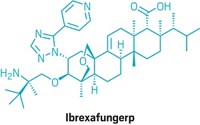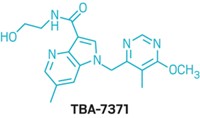Advertisement
Grab your lab coat. Let's get started
Welcome!
Welcome!
Create an account below to get 6 C&EN articles per month, receive newsletters and more - all free.
It seems this is your first time logging in online. Please enter the following information to continue.
As an ACS member you automatically get access to this site. All we need is few more details to create your reading experience.
Not you? Sign in with a different account.
Not you? Sign in with a different account.
ERROR 1
ERROR 1
ERROR 2
ERROR 2
ERROR 2
ERROR 2
ERROR 2
Password and Confirm password must match.
If you have an ACS member number, please enter it here so we can link this account to your membership. (optional)
ERROR 2
ACS values your privacy. By submitting your information, you are gaining access to C&EN and subscribing to our weekly newsletter. We use the information you provide to make your reading experience better, and we will never sell your data to third party members.
Pharmaceuticals
Treating TB Faster
Diarylquinoline is first selective TB agent in 40 years to reach clinical trials
by Stu Borman
December 13, 2004
| A version of this story appeared in
Volume 82, Issue 50

ANTIBIOTICS
A new tuberculosis drug with a novel mechanism of action may significantly shorten TB treatment regimens when used in combination with existing drugs.
TB is an often-fatal chronic bacterial infection that attacks the lungs and other organs. One-third of the world's population currently has latent or active TB, and the disease killed about 2 million people in 2002.
Treatment currently involves administering a cocktail of drugs for six to nine months. But compliance is poor, particularly in developing countries. Stopping treatment too soon can make patients relapse and cause the TB bacillus, Mycobacterium tuberculosis, to become drug-resistant.
Faster TB treatments are thus urgently needed, but no new antibiotic selective for TB and other mycobacteria has reached clinical trials in the past 40 years. Now, the first such agent, the diarylquinoline R207910, has been identified by Koen Andries of Johnson & Johnson Pharmaceutical R&D, Beerse, Belgium, and coworkers [Science, published online Dec. 9, http://dx.doi.org/10.1126/science.1106753].
They discovered the drug by screening compound libraries for antibiotic activity. R207910 was found to kill TB and other mycobacteria, including drug-resistant strains. It acts by inhibiting ATP synthase, a mechanism of action never before described for any antibiotic, Andries says.
When administered with other drugs to tubercular mice, R207910 shortened treatment times by about half, and it was well tolerated in Phase I studies in healthy human volunteers. The agent will be developed by Tibotec, in Mechelen, Belgium.








Join the conversation
Contact the reporter
Submit a Letter to the Editor for publication
Engage with us on Twitter